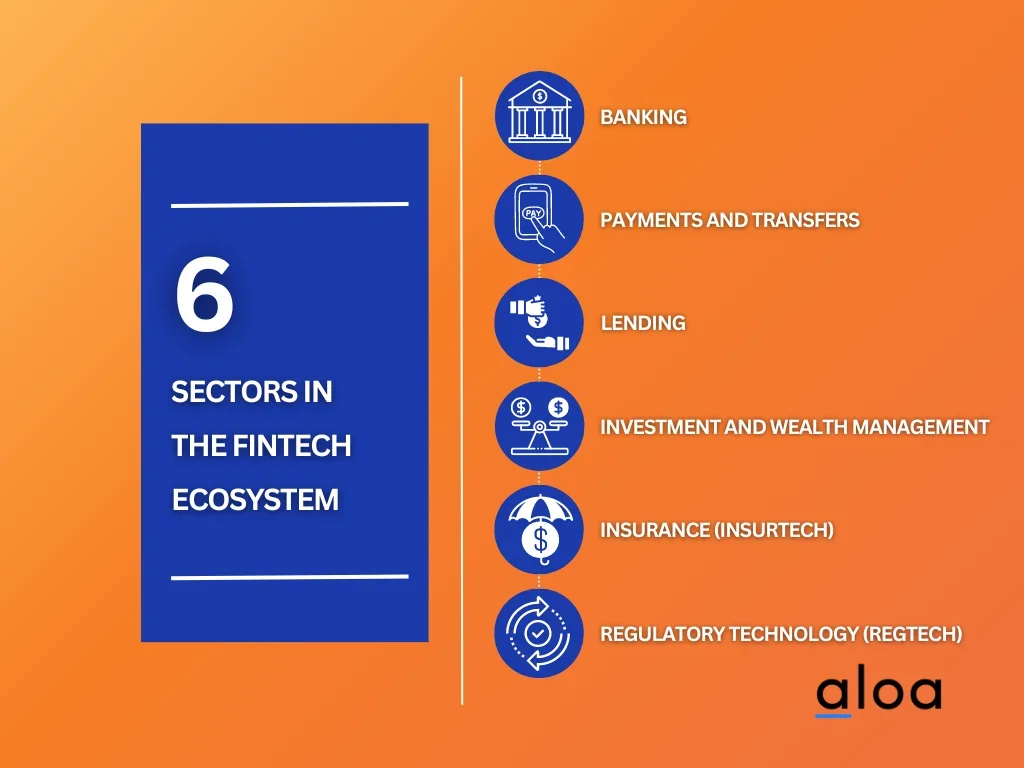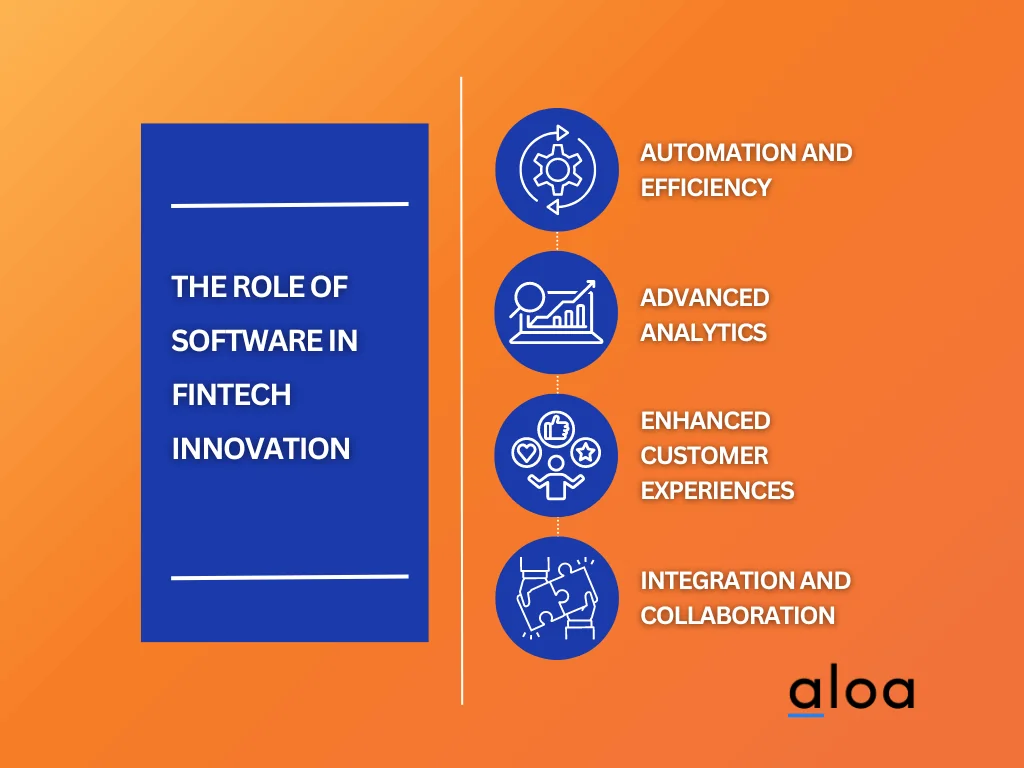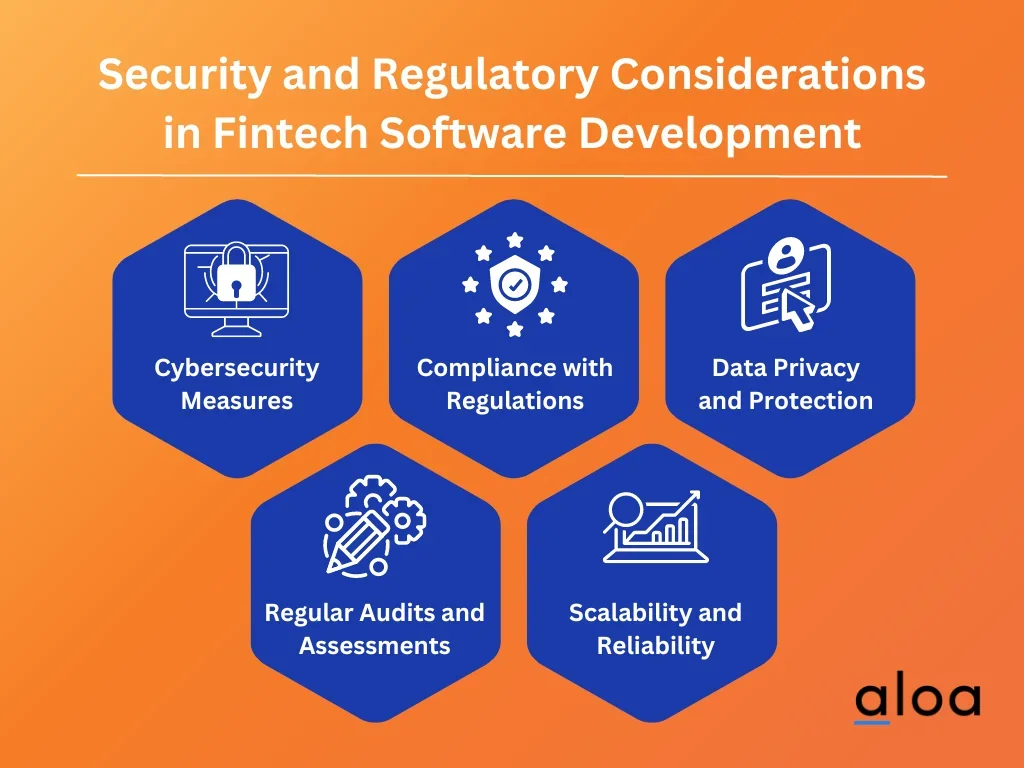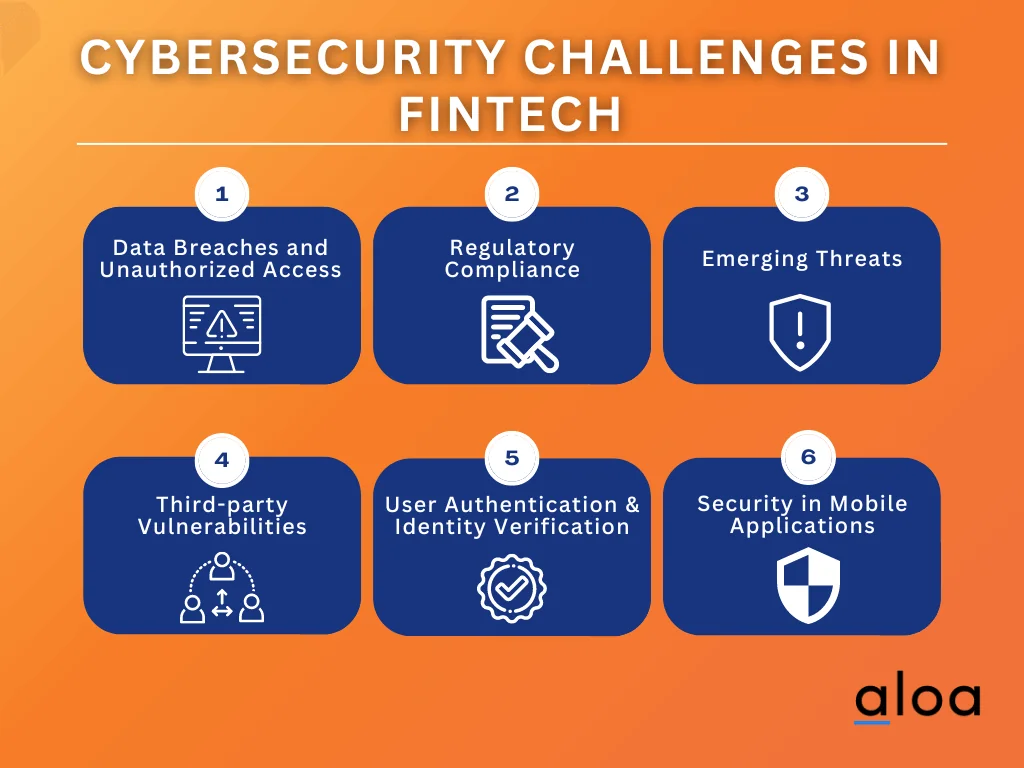The rise of financial technology (fintech) has significantly reshaped the financial services sector, touching upon every aspect of the industry. As dawn breaks on the digital age, a financial revolution is underway. New players in the financial services sector, collectively known as Fintech companies, are fundamentally altering how we transact, invest, and manage wealth. Emerging technologies such as artificial intelligence (AI), blockchain, and big data analytics pave the way for unprecedented innovation, spawning startups that challenge traditional financial institutions and global banks. In this transformative wave, businesses, startups, and the workforce must adapt or risk being left behind.
At Aloa, we understand the challenges the rapidly evolving fintech industry poses. As experts in software outsourcing, we can assist you in navigating these challenges and seizing the opportunities presented by fintech. We can help you embrace the changes in fintech, assist in overcoming the challenges, and capitalize on the opportunities it offers. We have the skills and knowledge to support your growth.
In this blog, we will dive deep into the various fintech sectors. By comprehensively understanding fintech's impact on each sector, you will be equipped with valuable insights to make informed decisions and capitalize on emerging trends. We aim to empower you to leverage fintech's potential and stay at the forefront of the financial technology industry. So, let's dive into the exciting world of fintech and discover its opportunities.
Let's get started!
What is Fintech?
Fintech is the cutting edge sector within finance that integrates technology into how individuals and businesses interact with money and financial transactions. It encompasses various sectors, including banking, payments, lending, investment, insurance, and regulatory technology (RegTech), and drives innovation in the finance industry.
The importance of fintech cannot be overstated, as it enhances financial accessibility, improves efficiency, and opens up new avenues for financial advice and services. Fintech plays a crucial role in everyday life by providing convenient and user-friendly financial solutions. Its impact is felt in our daily lives, as it offers accessible and efficient financial services, empowers individuals with personalized advice, and facilitates secure and convenient transactions. By embracing fintech, individuals and businesses can stay ahead in the ever-evolving financial landscape and leverage its many opportunities.
Fintech Sectors
Fintech encompasses a wide range of sectors, each contributing to the transformation of the finance industry. From banking and payments to lending, investment, insurance, and regulatory technology, fintech is reshaping how we engage with financial services.

Banking
In the realm of banking, fintech has ushered in significant changes. Traditional banks, challenger banks, and neobanks have embarked on digital transformations to enhance their services and remain competitive in the digital age.
Brief Overview
Challenger banks and neobanks, characterized by their digital-first approach, have emerged as formidable competitors to traditional banks. They prioritize user-friendly interfaces, seamless digital experiences, and agile operations. On the other hand, traditional banks are adapting to the digital landscape by embracing technological advancements, revamping their online and mobile banking platforms, and introducing innovative features.
Use Cases
Mobile banking is one of the prominent use cases in the fintech-driven banking sector. It allows users to perform various banking activities conveniently through mobile applications, including balance inquiries, fund transfers, bill payments, and more. Additionally, fintech has facilitated online account opening, simplifying the process and eliminating the need for in-person bank visits. Real-time payments, enabled by fintech solutions, ensure swift and secure transactions, enhancing customer experiences.
Payments and Transfers
The fintech revolution has dramatically impacted the payments and transfers landscape, introducing innovative solutions that simplify transactions and provide greater convenience. One such innovation is the ability to do money transfer online, which allows individuals to send money across borders quickly and securely without the need for traditional banking procedures.
Brief Overview
Peer-to-peer (P2P) payments have gained popularity as fintech enables individuals to transfer funds directly to each other using mobile applications, eliminating the need for intermediaries. Digital wallets have also emerged as a secure and convenient way to store payment credentials and conduct transactions seamlessly. Additionally, fintech has facilitated the rise of cryptocurrency transactions, offering decentralized and efficient digital currency exchange.
Use Cases
Fintech has revolutionized cross-border payments, reducing complexities and transaction costs associated with international transfers. It enables individuals and businesses to send and receive money globally faster and more transparently. Remittances, a crucial aspect of global finance, have also been transformed by fintech, allowing efficient and cost-effective transfer of funds across borders. Furthermore, contactless payments have gained popularity, especially in recent years, providing a secure and touchless payment experience through various fintech-driven solutions.
Lending
Fintech has disrupted the lending landscape, offering alternative lending platforms and streamlined processes that cater to the evolving needs of borrowers.
Brief Overview
Peer-to-peer (P2P) lending platforms have revolutionized the lending industry by directly connecting borrowers with lenders through online platforms. These platforms leverage fintech to facilitate loan transactions, removing the traditional intermediaries and reducing costs. Digital lending, another fintech innovation, provides borrowers with simplified loan application processes, faster approvals, and customized lending options.
Use Cases
Fintech-driven lending has opened doors to payday loans, allowing borrowers to access funds quickly and conveniently through digital channels. Microcredit, often facilitated by fintech platforms, addresses the financial needs of individuals and small businesses by providing small loan especially SBA loans with minimal documentation requirements. Additionally, fintech has revolutionized credit scoring models, utilizing alternative data and advanced algorithms to assess creditworthiness beyond traditional credit metrics.
Investment and Wealth Management
Fintech has transformed investment and wealth management, democratizing access to financial markets and offering innovative tools for personalized financial planning.
Brief Overview
Robo-advisors, powered by fintech algorithms and machine learning, provide automated investment advice and portfolio management services. These platforms offer investors diversified investment options, personalized recommendations, and cost-effective solutions. Furthermore, online trading platforms have disrupted traditional brokerage services, enabling individuals to conveniently trade stocks, commodities, and other financial instruments through intuitive digital interfaces. Before choosing savings accounts, investment products, or financial tools, users can rely on a money comparison website to evaluate interest rates, fees, and market options with greater transparency.
Use Cases
Fintech-driven investment and wealth management solutions cater to individuals' financial goals and risk preferences, providing personalized investment advice. These solutions offer optimized portfolios, asset allocation strategies, and real-time monitoring by leveraging AI and data analytics. Platforms like an excellent all-in-one platform can further support investors by streamlining research and decision-making. Fintech innovations in this sector empower individuals to make informed investment decisions and manage their wealth efficiently.
Insurance (Insurtech)
Fintech has brought forth significant changes in the insurance industry, giving rise to "insurtech" and introducing innovative approaches to insurance services.
Brief Overview
Digital brokers have emerged due to fintech advancements, allowing individuals to easily compare insurance policies, obtain quotes, and purchase coverage online. Insurtech also utilizes AI-based risk assessment models, leveraging data analytics to accurately assess risks, determine premiums, and streamline insurance underwriting processes.
Use Cases
Fintech-driven insurance solutions have led to usage-based insurance, where premiums are determined based on an individual's usage or behavior, such as mileage or driving habits. Personalized insurance policies have also gained traction, allowing individuals to tailor coverage to their specific needs and preferences.
By leveraging fintech in the insurance sector, customers can enjoy more accessible, flexible, and personalized insurance solutions, while insurers benefit from streamlined operations and improved risk assessment capabilities.
Regulatory Technology (RegTech)
Fintech's influence extends to regulatory technology (RegTech), transforming compliance and risk management practices within the financial industry.
Brief Overview
RegTech offers innovative solutions that simplify and streamline compliance processes for financial institutions. It enables automated monitoring of regulatory requirements, real-time reporting, and robust risk management frameworks. These solutions leverage fintech innovations such as data analytics, AI, and machine learning to ensure regulatory compliance while reducing costs and improving efficiency.
Use Cases
RegTech solutions are critical in combating financial crimes such as money laundering. They employ advanced algorithms and data analysis to detect suspicious activities, verify customer identities, and ensure adherence to Anti-Money Laundering (AML) and Know Your Customer (KYC) regulations. Fintech-driven RegTech solutions enhance the effectiveness of compliance measures and contribute to a more secure financial ecosystem.
Fintech has revolutionized various segments of the finance industry, from banking and payments to lending, investment and wealth management, insurance, and regulatory technology. By embracing fintech innovations, businesses and individuals can benefit from enhanced accessibility, efficiency, and personalized services across these sectors. Technology integration in finance continues to reshape the industry, offering transformative solutions and improving the financial landscape.
Role of Software in Fintech Innovation
Software is pivotal in driving fintech innovation, enabling the development and implementation of cutting-edge solutions that reshape the finance industry. Through sophisticated algorithms, data analytics, and automation, fintech software empowers businesses to enhance efficiency, improve customer experiences, and unlock new possibilities.

Automation and Efficiency
Fintech software streamlines processes, automating repetitive tasks such as transaction processing, data entry, and compliance checks. This reduces manual effort, minimizes errors, and enables faster, more accurate results. For example, software-based robo-advisors automate investment management, providing personalized advice and portfolio management at scale.
Advanced Analytics
Fintech software leverages data science and analytics to derive valuable insights from vast financial data. By analyzing market trends, customer behaviors, and risk factors, businesses can make data-driven decisions, identify investment opportunities, and tailor financial products and services to individual needs.
Enhanced Customer Experiences
Fintech software strongly emphasizes user-centric design and personalized experiences. Mobile applications and digital platforms enable convenient and intuitive access to financial services, allowing customers to manage their finances, make payments, and seek financial advice from the comfort of their devices. These platforms often include integrated tools for improved customer experience. For example, Clutch, a car marketplace, provides auto financing, and so they've integrated an auto loan calculator in Canada, providing users with instant calculations and comparisons that enhance their decision-making experience without leaving the app. Chatbots and AI-powered customer service solutions improve response times and provide instant support.
Integration and Collaboration
Fintech software facilitates seamless integration between financial institutions, startups, and other stakeholders. Open banking APIs enable secure data sharing, allowing customers to access their financial information across multiple platforms and enabling collaboration between service providers. This promotes innovation, enables partnerships, and expands the range of financial products and services available to customers.
Fintech Software Types and Their Uses
Different fintech software serves various purposes in the finance industry:
- Mobile Banking Applications: Users can perform banking activities on their smartphones, such as transfers, payments, and account management.
- Trading and Investment Platforms: Power online platforms for trading stocks, commodities, and cryptocurrencies, offering real-time data and advanced tools.
- Robo-advisory Platforms: Utilize algorithms to provide automated investment advice and portfolio management based on investors' profiles and goals.
- Payment Gateways and Processors: Enable secure and efficient processing of financial transactions for online payments and e-commerce.
- Risk Management and Compliance Software: Aid in risk assessment and compliance with regulations like AML and KYC, using data analytics and machine learning algorithms.
Security and Regulatory Considerations in Fintech Software Development
Developing secure and compliant fintech software safeguards customer data and ensures regulatory adherence. Fintech firms must address the following considerations:

Cybersecurity Measures
Fintech software must implement robust security protocols, including encryption, two-factor authentication, and secure data storage, to protect sensitive financial information from unauthorized access and cyber threats.
Compliance with Regulations
Fintech software development should adhere to relevant financial regulations and standards, such as those set by regulatory bodies like the Securities and Exchange Commission (SEC) and the Financial Conduct Authority (FCA). Compliance solutions and practices must be integrated into the software to ensure adherence to regulatory requirements.
Data Privacy and Protection
Fintech software must comply with data protection laws like Europe's General Data Protection Regulation (GDPR). It should incorporate measures to handle and store personal and financial data securely while providing transparency and control to users over their data.
Regular Audits and Assessments
Fintech software should undergo regular security audits and assessments to identify vulnerabilities, address potential risks, and ensure compliance with ongoing security and regulatory standards.
Scalability and Reliability
Fintech software should be designed to handle increasing transaction volumes and user demands. It should be reliable, provide uninterrupted service, and have robust disaster recovery plans.
By considering these security and regulatory aspects during fintech software development, businesses can build trust with customers, mitigate risks, and ensure the integrity and reliability of their financial technology solutions.
Cybersecurity Challenges in Fintech

Cybersecurity is a critical concern for fintech companies in the digital age due to the sensitive nature of financial transactions and data. Fintech faces unique cybersecurity challenges that must be addressed to safeguard customer information and maintain the integrity of financial systems. Here are the critical challenges faced by fintech in cybersecurity:
Data Breaches and Unauthorized Access
Fintech companies handle vast amounts of sensitive financial data, making them attractive targets for cybercriminals. Data breaches can result in financial loss, identity theft, and company reputation damage. To help mitigate these risks, organizations can utilize a digital footprint checker to identify exposed data, monitor potential vulnerabilities, and proactively secure their online presence.
Regulatory Compliance
Fintech companies must adhere to stringent data protection and privacy regulations. Failure to comply can lead to significant fines, legal consequences, and reputational damage.
Emerging Threats
As technology evolves, so do cybersecurity threats. Fintech companies must stay vigilant against emerging threats such as ransomware, phishing attacks, malware, and social engineering.
Third-party Vulnerabilities
Fintech companies often rely on third-party service providers, increasing the risk of cybersecurity vulnerabilities. Ensuring the security of these partnerships and managing third-party risk is crucial.
User Authentication and Identity Verification
Fintech companies must implement robust authentication and verification methods to prevent unauthorized access and identity fraud.
Security in Mobile Applications
With the rise of mobile technology, securing fintech applications becomes crucial. Protecting data and transactions on mobile devices and addressing vulnerabilities specific to mobile platforms is a significant challenge.
Addressing these challenges requires proactive measures, including implementing robust security protocols, conducting regular vulnerability assessments, investing in cybersecurity infrastructure, and educating employees and customers on cybersecurity best practices. By prioritizing cybersecurity, fintech companies can protect their systems, gain customer trust, and contribute to a more secure financial ecosystem.
Key Takeaways
In the rapidly evolving fintech landscape, software development is crucial in driving innovation and shaping the industry's future. Fintech companies use software to create user-friendly applications, robust platforms, and cutting-edge solutions that enhance financial services and customer experiences. As the fintech sector expands, it is crucial to consider the impact of regulations, cybersecurity challenges, and emerging technologies like AI, blockchain, and Big Data.
Looking towards the future, fintech companies must consider various factors to stay ahead of the curve. By staying proactive and embracing these considerations, fintech companies can continue to drive positive change and provide innovative financial solutions to meet evolving customer needs.
Important considerations for the future of fintech include staying abreast of emerging technologies, adapting to changing regulations, and prioritizing cybersecurity. For further assistance or guidance in navigating these challenges, you can contact Aloa at [email protected]. Our experts are ready to support you on your fintech journey.

